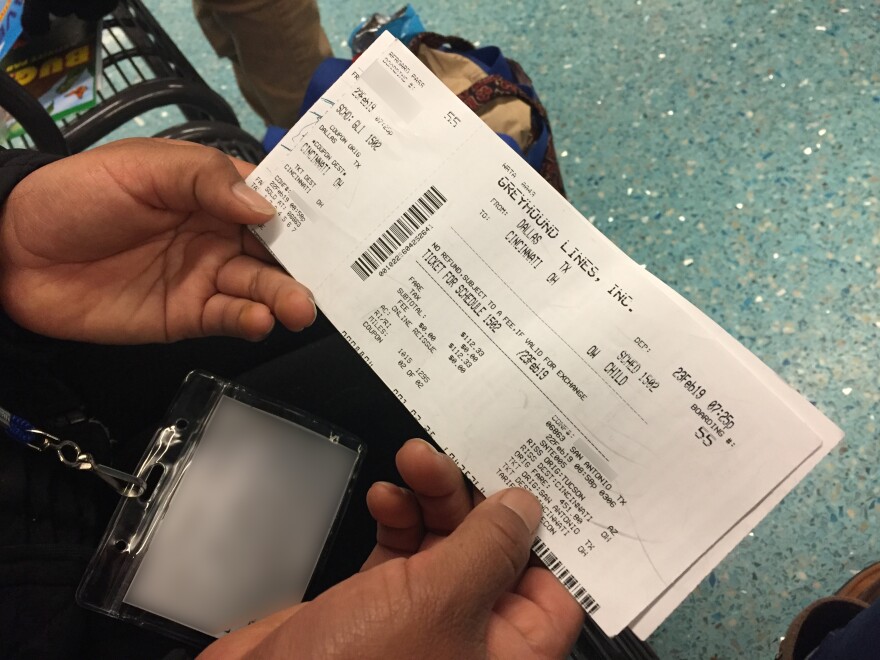When the bus coming from Texas finally pulls into the Memphis Greyhound station, it’s 20 minutes late. As the passengers disembark, Rosa Mena quickly spots the strangers she’s learned to identify with just a few clues.
Some are disoriented or speaking Spanish. Some are clutching manila envelopes containing their immigration papers.
“Hola!”
Mena greets a small child and hands over a brown bag lunch.
Mena and two others continue passing out water bottles and sack lunches to a dozen or so men, women and children now congregating on the bus station’s metal seating.
These are migrants—asylum seekers—typically arriving from near the Mexican border after spending time in a detention center or other holding facilities.
“Estás embarazada?”
Mena asks a young woman traveling alone to Wisconsin if she’s pregnant and needs any special accommodations. She’s wearing only a thin jacket. Mena offers her a winter coat, gloves and hat to keep her warm as she ventures into the the wintry northern U.S.
Mena is part of a group called the Mariposas Collective, which is Spanish for butterflies. Since November, roughly 200 volunteers have assisted people traveling through Memphis on their way to meet their immigration sponsors, a typical part of the asylum process.
“Our bus station is just a hub for anybody going north and spreading out,” says Laura Coleman, one of the collective’s founders. “Think of Memphis like the Atlanta Airport; everybody goes through here.”

This means that volunteers find themselves at the station seven days a week for five separate shifts, starting at 4 a.m.
Many of the 100 or so immigrants passing through Memphis daily lack basic necessities. That’s where Mariposas steps in—handing out food, warm clothes, toiletries and medicine. Spanish-speaking volunteers also help translate bus tickets, telling travelers where to get off and how long their layovers may last.
“Asylum seekers are pretty brave and pragmatic and completely capable of taking care of themselves,” says Coleman. “I’m just making it easier as they pass through Memphis.”
Most identify themselves as asylum seekers from Central America, fleeing violence or persecution in Honduras or Guatemala.
Volunteer Federico Gomez says people are relieved to see a friendly face and hear a familiar language.
“If I get into the station at 4 a.m. in the morning and I see, as I’ve seen multiple times, a child with no shoes or no socks, the act of providing that if we have it, it’s not a political act,” he says.
For Gomez, it’s humanitarian. The buses carry a stream of sick children, lost parents, and people heading into freezing temperatures wearing little more than flip flops.
The circumstances and challenges these travelers face are as varied as the shifting immigration policies coming out of Washington, says local immigration attorney Erica Tamariz.
“A lot of times, the people are just released because there’s no space in the detention center or because there's rules about how long you can detain children,” Tamariz says. “So they just kind of let them go.”
This often happens without notice, which is why, Tamariz adds, the bus station sees so many people with little more than a ticket and a destination.
Mariposas operates out of First Congregational Church in Midtown. In a room brimming with provisions, Patricia Schwarz points out blankets, socks, toothbrushes and clothing items neatly sorted and labeled by gender and size.
“We need more than anything, we need coats, heavy winter coats,” she says.

The collective relies solely on donated goods and cash contributions. Most of its budget —about $200 a day—pays for the sack lunches.
Co-founder Lee Coleman says Mariposas is now part of a regional network of assistance for asylum seekers. A dozen sister organizations have popped up in bus stations from Nashville to Richmond. They share information about needs that can’t be met here.
“If we did have someone who was sick, that we couldn’t do anything for, we would ask for help further downstream,” he says.“Or if we had someone who needed a coat and we didn’t have one that fit, we could ask for more.”
Lee wonders how long the group can keep up with the constant influx of migrants. He’d like to see Mariposas do more. But in the meantime, Lee knows the next bus is already just a few hours away.
“We are merely meeting fellow humans, trying to provide some comfort...as they’re seeking safety and seeking asylum,” he says.


